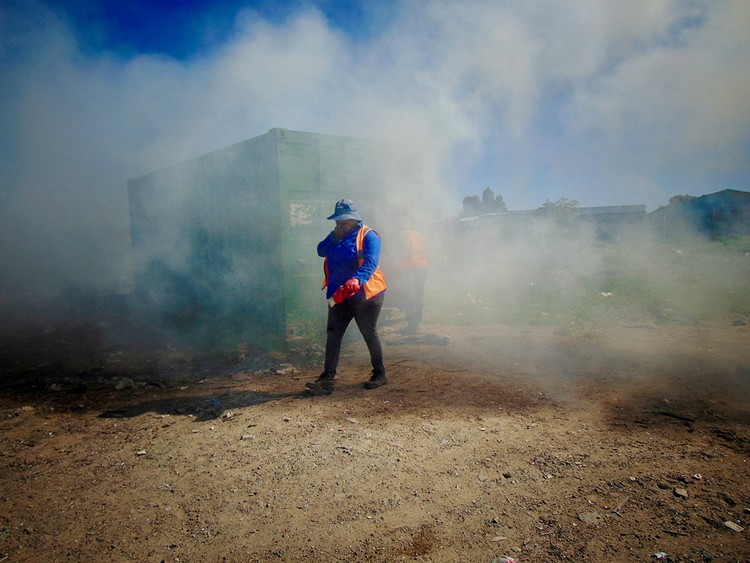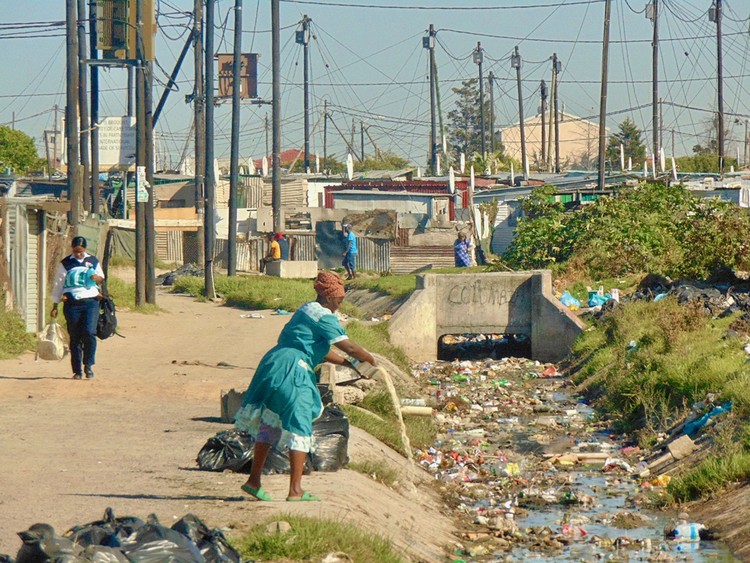A day in the life of a Cape Town waste collector
Avuyile Masekwane’s job is difficult but she will be sorry when her contract ends
Avuyile Masekwane burns rubbish in Burundi, in Mfuleni in Cape Town. Photos: Masixole Feni
This is Avuyile Masekwane’s last month as a refuse collector in Mfuleni, Cape Town. Though the work is difficult and demanding, she will be sorry when her 12-month contract ends at the end of February.
Twenty-seven-year-old Masekwane works for the Expanded Public Works Programme (EPWP) collecting rubbish, five days a week, from 8:30am to 3:30pm. She earns R27 an hour.
She gets up at 6am. At 7:30 she wakes up her four-year-old son, Sinokuhle, and washes him with water in a bucket she filled the night before from the communal tap. “By 8am I take him to school so he can still get the porridge served warm.”
By 8:15am she is at work, collecting and sorting rubbish and throwing it in one of the green containers provided by the City.
“People scatter the rubbish all over the place, that’s when we come in, and organise it in order,” she says.
Masekwane is used to seeing dirty nappies, human excrement, and condoms. And lots of beer bottles. She and her colleagues separate what can be recycled, mainly glass.
It’s hot and tiring work, especially in the summer. “We are on our feet all day.”
There are communal taps to drink from and wash her hands, and at midday she takes a break. “If I have a lunch box I eat at work, other days I go home and prepare something to eat,” she says.
At 4pm she fetches Sinokuhle from school. At home she rests for half an hour then it’s the evening routine of fetching water, washing, cooking and settling Sinokhule in bed.
“What makes me happy about my job is that we all know each other because we’re from the same community,” she says. “And the best part is we don’t have to pay for traveling to get to the workplace.”
“And the community is showing love and support for the work we do cleaning up our environment.”
The job needs patience, she says, and understanding of other people.
Masekwane will be sorry to stop work, but she says it’s right that other people on the EPWP database should have their chance. “They also need to earn an income.”
As for her, she’ll be out looking for another job.
The ditch in Burundi is full of rubbish.
Support independent journalism
Donate using Payfast

Don't miss out on the latest news
We respect your privacy, and promise we won't spam you.
Next: Ronald Lamola’s promise to protect whistleblowers is good news. Especially coming from him
Previous: You can’t be fired just because you’re unpopular, court says
© 2023 GroundUp. This article is licensed under a Creative Commons Attribution-NoDerivatives 4.0 International License.
You may republish this article, so long as you credit the authors and GroundUp, and do not change the text. Please include a link back to the original article.
We put an invisible pixel in the article so that we can count traffic to republishers. All analytics tools are solely on our servers. We do not give our logs to any third party. Logs are deleted after two weeks. We do not use any IP address identifying information except to count regional traffic. We are solely interested in counting hits, not tracking users. If you republish, please do not delete the invisible pixel.


